
Arabic_for_Dummies
.pdf
146 Part II: Arabic in Action
kura (koo-rah; ball)
laa’ib (lah-eeb; player) (MS)
laa’iba (lah-ee-bah; player) (FS)
kurat al-qadam is only one of the many sports popular with Arabic speakers and peoples of the Middle East. Here are some other favorite sports:
sibaaHa (see-bah-hah; swimming)
furusiiyya (foo-roo-see-yah; horseback riding)
kurat aT-Taa’ira (koo-rat ah-tah-ee-rah; volleyball)
kurat as-salla (koo-rat ah-sah-lah; basketball)
kurat al-miDrab (koo-rat al-meed-rab; tennis)
daraaja (dah-rah-jah; cycling)
tazaHluq (tah-zah-look; skiing)
tazalluj (tah-zah-looj; ice skating)
jumbaaz (joo-meh-baz; gymnastics)
siyaaqat as-sayaara (see-yah-kat ah-sah-yah-rah; racecar driving)
One of the most common verbs used with sports and other recreational activities is la’aba (lah-ah-bah; play). Because the verb la’aba is commonly used and important — much like the verb fa’ala — knowing how to conjugate it in both the maaDii and the muDaari’ is a good idea.
Here’s the verb la’aba in the maaDii form:
Form |
Pronunciation |
Translation |
‘anaa la’abtu |
ah-nah lah-ahb-too |
I played |
‘anta la’abta |
ahn-tah lah-ahb-tah |
You played (MS) |
‘anti la’abti |
ahn-tee lah-ahb-tee |
You played (FS) |
huwa la’aba |
hoo-wah lah-ah-bah |
He played |
hiya la’abat |
hee-yah lah-ah-bat |
She played |
naHnu la’abnaa |
nah-noo lah-ahb-naa |
We played |
‘antum la’abtum |
ahn-toom lah-ahb-toom |
You played (MP) |
‘antunna la’abtunna |
ahn-too-nah lah-ahb-too-nah |
You played (FP) |
hum la’abuu |
hoom lah-ah-boo |
They played (MP) |
hunna la’abna |
hoo-nah lah-ahb-nah |
They played (FP) |

Chapter 8: Enjoying Yourself: Recreation 147
Form |
Pronunciation |
Translation |
antumaa la’abtumaa |
ahn-too-mah lah-ahb-too-mah You played (dual/ |
|
|
|
MP/FP) |
humaa la’abaa |
hoo-mah lah-ah-bah |
They played (dual/ |
|
|
MP) |
humaa la’abataa |
hoo-mah lah-ah-bah-tah |
They played (dual/ |
|
|
FP) |
Use the form yal’abu to conjugate “to play” in the muDaari’: |
||
Form |
Pronunciation |
Translation |
‘anaa ‘al’abu |
ah-nah al-ah-boo |
I am playing |
‘anta tal’abu |
ahn-tah tal-ah-boo |
You are playing (MS) |
‘anti tal’abiina |
ahn-tee tal-ah-bee-nah |
You are playing (FS) |
huwa yal’abu |
hoo-wah yal-ah-boo |
He is playing |
hiya tal’abu |
hee-yah tal-ah-boo |
She is playing |
naHnu nal’abu |
nah-noo nal-ah-boo |
We are playing |
‘antum tal’abuuna |
ahn-toom tal-ah-boo-nah |
You are playing (MP) |
‘antunna tal’abna |
ahn-too-nah tal-ahb-nah |
You are playing (FP) |
hum yal’abuuna |
hoom yal-ah-boo-nah |
They are playing |
|
|
(MP) |
hunna yal’abna |
hoom yal-ah-boo-nah |
They are playing (FP) |
antumaa tal’abaani |
ahn-too-mah tal-ah-bah-nee |
You are playing |
|
|
(dual/MP/FP) |
humaa yal’abaani |
hoo-mah yal-ah-bah-nee |
They are playing |
|
|
(dual/MP) |
humaa tal’abaani |
hoo-mah tal-ah-bah-nee |
They are playing |
|
|
(dual/FP) |
The sentence structure for creating verbs is such that you use the verb la’aba or yal’abu followed by the sport or activity you’re playing. For example, you may say ‘anaa ‘al’abu kurat as-salla (I am playing basketball) or hiya la’abat kurat al-miDrab (She played tennis). As you can see from these examples, all you do is start with the personal pronoun and verb conjugation, attach the sport you’re referring to, and voila!
Another important phrase commonly used relating to sports and other fun activities is hayyaa binaa (hah-yah bee-nah; Let’s go). You’ll often hear friends telling each other hayyaa binaa followed by the activity or location of the activity, such as hayyaa binaa ‘ilaa mal’ab kurat al-qadam (hah-yah beenah ee-lah mal-ahb koo-rat al-kah-dam; Let’s go to the soccer field).
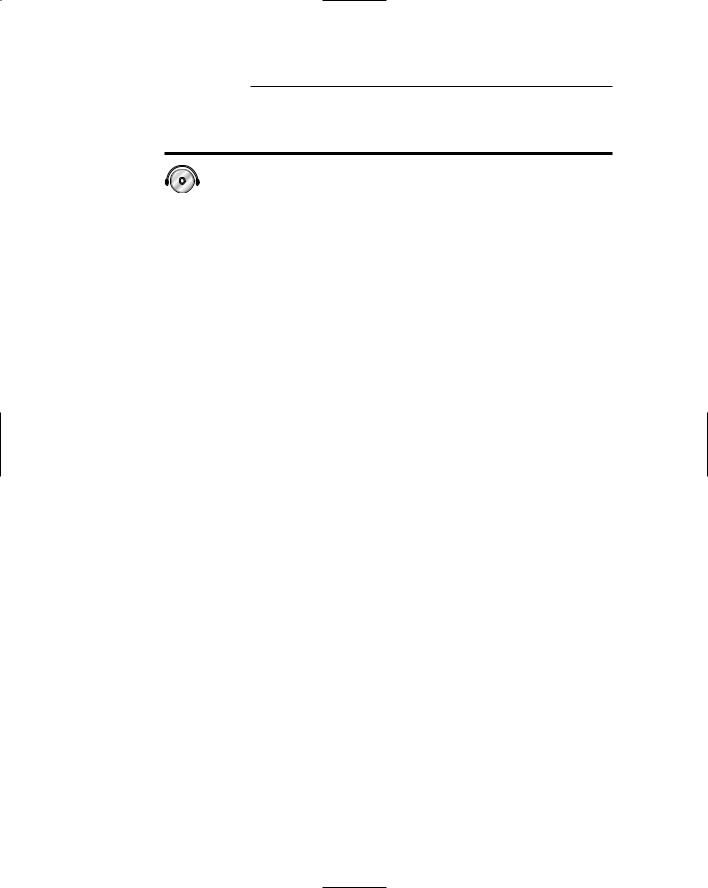
148 Part II: Arabic in Action
Talkin’ the Talk
Karim and Kamal are scheduling a soccer game.
Karim:
Kamal:
Karim:
Kamal:
Karim:
Kamal:
Karim:
Kamal:

|
|
|
Chapter 8: Enjoying Yourself: Recreation 149 |
|
|
|
|
||
|
Karim: |
laa sha’na lanaa bidhaalika. lam naHtaaj bi |
||
|
|
al-malaabis riyaaDiyya. |
||
|
|
lah sha-nah lah-nah bee-zah-lee-kah. lam nah-taj bee |
||
|
|
al-mah-lah-bees ree-yah-dee-yah. |
||
|
|
That’s not a big deal. We really don’t need uniforms. |
||
|
Kamal: |
kwayyis. ‘ilaa al-ghad. |
||
|
|
keh-wah-yees. ee-lah al-gad. |
||
|
|
Okay. See you tomorrow. |
||
|
Karim: |
‘ilaa al-ghad. |
||
|
|
ee-lah al-gad. |
||
|
|
See you tomorrow. |
||
|
|
|
|
|
Words to Know
fikra |
feek-rah |
idea |
ghadan |
gah-dan |
tomorrow |
saa’a |
sah-ah |
time |
madrasa |
mad-rah-sah |
school |
kura |
koo-rah |
ball |
mal’ab |
mah-lab |
stadium |
Going to the Beach
One of my favorite places is the shaaTi’ (shah-teeh; beach); whether you go to the shaaTi’ with your ‘aSdiqaa’ (ass-dee-kah; friends) or your ‘usra (oos-rah; family), it’s a really great place to have a fun time! You can do some sibaaHa (see-bah-hah; swimming) in the muHiiT (moo-heet; ocean) or play around in the ramla (rah-meh-lah; sand).
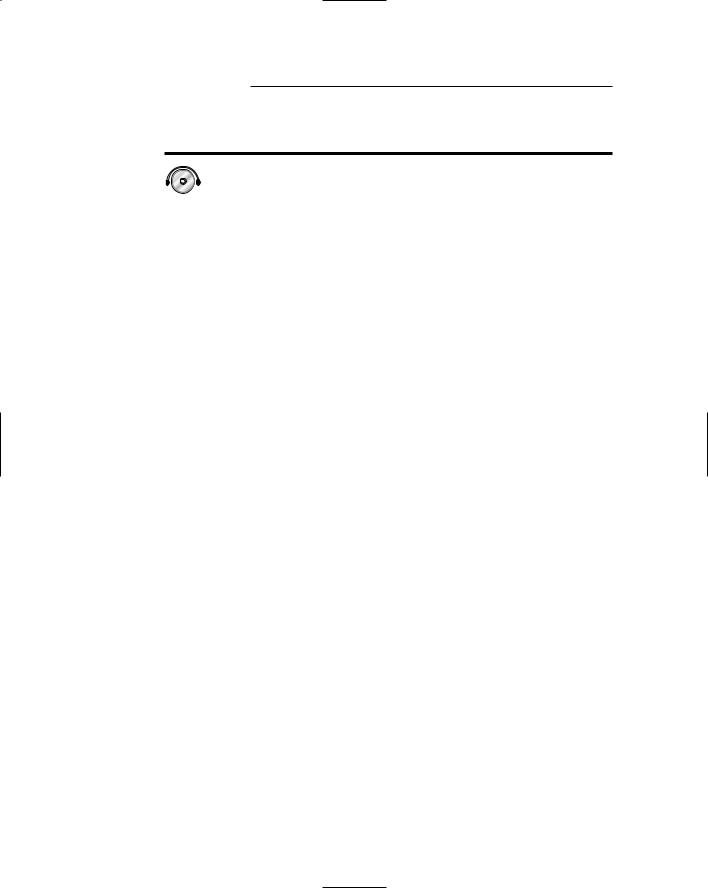
150 Part II: Arabic in Action
Talkin’ the Talk
Rita is trying to convince her mother to take her to the beach.
Rita:
Mother:
Rita:
Mother:
Rita:
Mother:
Rita:
Mother:

Chapter 8: Enjoying Yourself: Recreation 151
Words to Know
malaabis |
mah-lah-bees |
bathing suit |
as-sibaaHa |
ah-see-bah-hah |
|
dihaan shamsii |
dee-han shah- |
sunscreen |
|
meh-see |
|
shams |
shah-mes |
sun |
saHaab |
sah-hab |
cloud |
shaaTi’ |
shah-teeh |
beach |
muHiiT |
moo-heet |
ocean |
miDalla |
mee-dah-lah |
beach umbrella |
ramla |
rah-meh-lah |
sand |
mooja |
moo-jah |
wave |
Playing Musical Instruments
I happen to agree with the saying that moosiiqaa (moo-see-kah; music) is a universal language. No matter where you come from or what languages you speak, moosiiqaa has the power to break down barriers and bring people closer together than perhaps any other activity. Popular aalaat moosiiqiyya (ah-lat moo-see-kee-yah; musical instruments) include:
biiyaano (bee-yah-noo; piano)
qiithaar (kee-thar; guitar)
kamanja (kah-mah-neh-jah; violin)
Tabl (tah-bel; drums)
fluut (feh-loot; flute)
buuq (book; trumpet)
saaksuufuun (sak-soo-foon; saxophone)
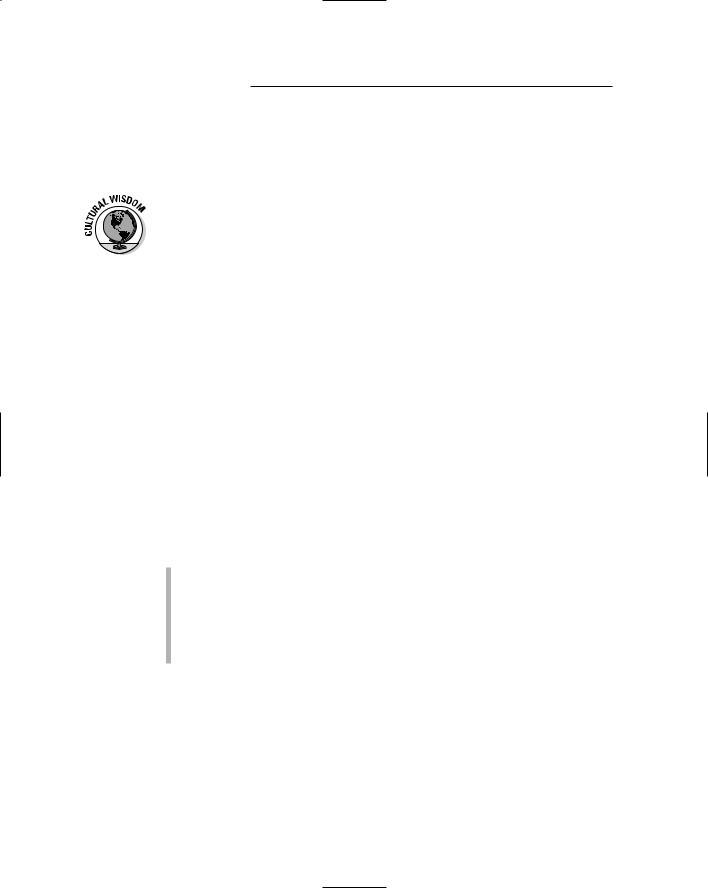
152 Part II: Arabic in Action
In order to say that someone plays a particular instrument, use the muDaari’ form of the verb yal’abu. For example yal’abu al-qiithaar means “He plays the guitar” or “He is playing the guitar” because the muDaari’ describes both an ongoing and a habitual action.
Middle Eastern music is one of the most popular types of music in the world. It is characterized by a special kind of string instrument called the ‘uud (ood) that has 12 strings and a round hollow body. The ‘uud is generally accompanied by a number of percussion instruments, such as the regular drum and the special Tabla (tah-beh-lah) that keeps the beat and adds extra flavor to the serenading of the ‘uud.
A particularly popular kind of Middle Eastern music is Rai (rah-yee), which originated in the early 90s in Algeria, Morocco, and Tunisia. Rai uses a lot of traditional Arabic instruments such as the ‘uud and the Tabla but adds modern rock and roll and jazz instruments such as the electric guitar, the saxophone, and the trumpet. One of the most popular singers of Rai music is
Sheb Khaled.
Popular Hobbies
Besides riyaaDa and moosiiqaa, you may enjoy a number of other types of hobbies. Do you consider qiraa’a (kee-rah-ah; reading) a hiwaaya (hee-wah- yah; hobby)? Perhaps you’re creative and like rasm (rah-sem; drawing) or fakhaar (fah-kar; pottery)?
Some other popular hobbies include:
waraq al-la’ib (wah-rak ah-lah-eeb; cards)
raqS (rah-kes; dancing)
shaTranj (sha-teh-rah-nej; chess)
Hiyaaka (hee-yah-kah; knitting)
shi’r (shee-ar; poetry)
When you want to discuss hobbies and personal activities, use the verb la’aba (for conjugations, check out “Sporting an Athletic Side” earlier in this chapter). For example, you say la’abtu kurat al-qadam (lah-ab-too koo-rat al- kah-dam; I played soccer) or la’aba al-kamanja (lah-ah-bah al-kah-mah-neh- jah; He played the violin). Here are some other example sentences that pair activities with the verb la’aba:

Chapter 8: Enjoying Yourself: Recreation 153
la’abat shaTranj. (lah-ah-bat sha-teh-rah-nej; She played chess.)
la’abnaa kurat as-salla. (lah-ab-nah koo-rat ah-sah-lah; We played basketball.)
la’abaa waraq al-la’ib. (lah-ah-bah wah-rak ah-lah-eeb; They played cards.) (dual/MP/FP)
However, there are times when you’re going to use the verb fa’ala. Generally speaking, the verb fa’ala is used to discuss activities that are more workrelated than hobbies. For instance, you say fa’altu al-waajib (fah-al-too al- wah-jeeb; I did the homework). As a rule, use the verb la’aba when you’re discussing hobbies such as sports and playing musical instruments.
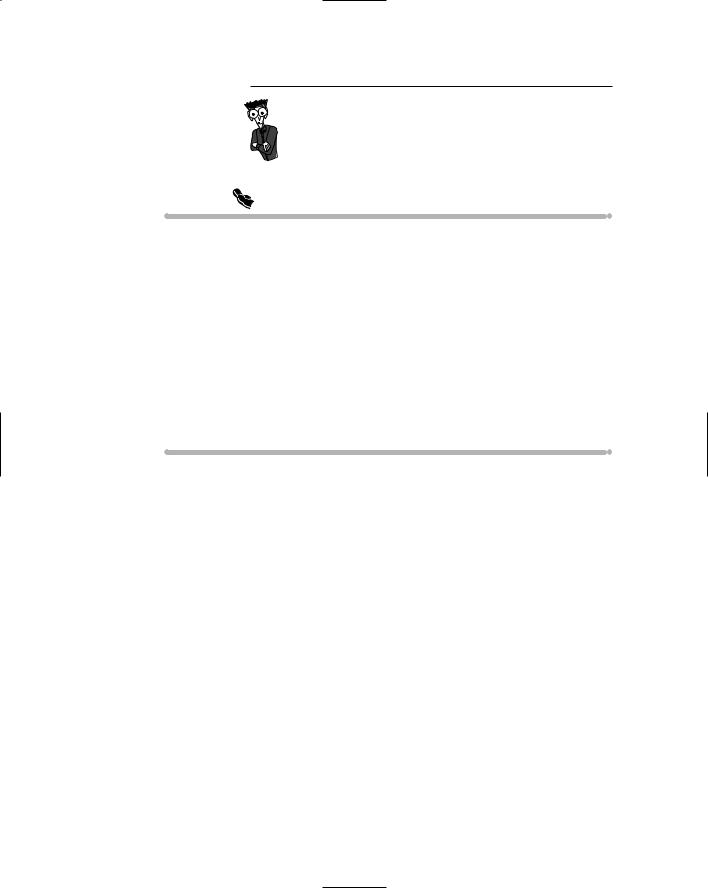
154 Part II: Arabic in Action
 Fun & Games
Fun & Games
Draw lines connecting the Arabic activities on the left with their English equivalents on the right.
shaTranj |
basketball |
rasm |
guitar |
shi’r |
swimming |
kurat al-miDrab |
drawing |
sibaaHa |
chess |
kurat as-salla |
tennis |
qiithaar |
poetry |
The answers are in Appendix C. |
|
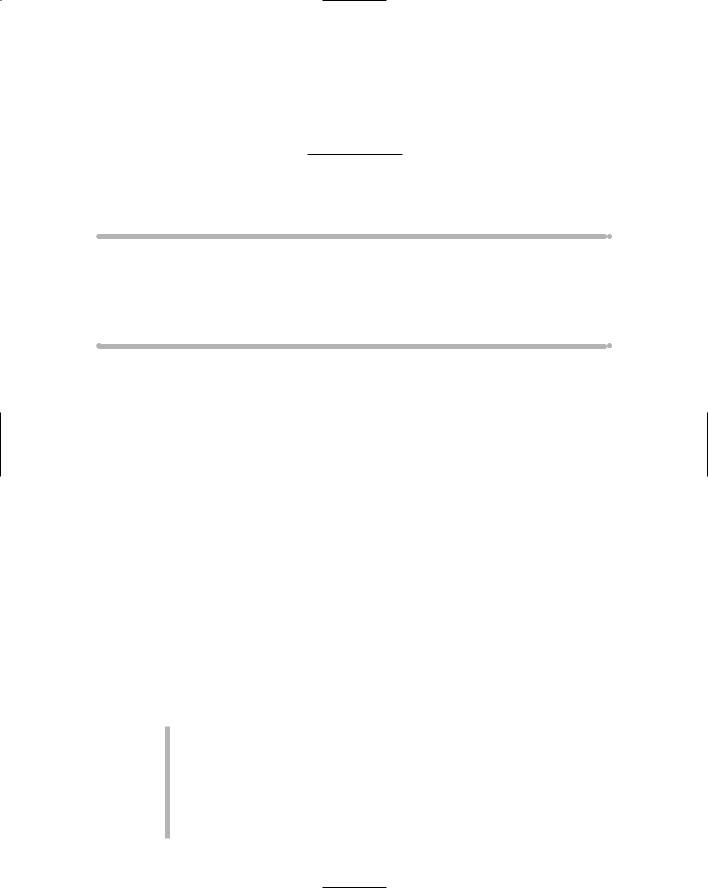
Chapter 9
Talking on the Phone
In This Chapter
Beginning a phone conversation
Making plans over the phone
Leaving a phone message
Personally, I really enjoy talking on the haatif (haa-teef; phone). It’s a great way to catch up with friends, make social arrangements, and plan other
aspects of your life with ease. With just a phone, you can get in touch with anyone in the world and talk about anything you like — from sports to social events and schoolwork to office gossip!
A few decades ago you may have been limited as to where you could hold a mukaalama haatifiyya (moo-kaah-la-mah haa-teef-eeya; phone conversation). Today, with the ubiquity of cell phones and other portable phone units, you can literally take your conversation anywhere! This flexibility makes knowing how to hold a phone conversation in Arabic even more important. In this chapter, I explain how to properly begin and end a mukaalama haatifiyya, how to make plans over the phone, and how to leave a proper phone message in Arabic. With all that information, you can be confident that you’re carrying on a proper phone conversation like a native speaker!
Dialing Up the Basics
Before you can chat on the haatif (haa-teef; telephone) with your friends like a native speaker, you need to be familiar with the following basic terminology:
haatif ‘aam (haa-teef aahm; public phone)
haatif selulayr (haa-teef seh-loo-layer; cellphone)
raqm al-haatif (rak-em al-haa-teef; phone number)
biTaaqat al-haatif (bee-taa-kaht al-haa-teef; phone card)
mukaalama haatifiyya (moo-kaah-la-mah haa-teef-eeya; phone conversation)
